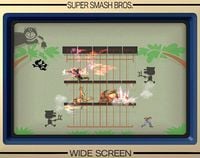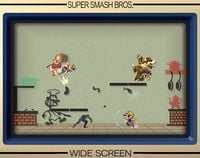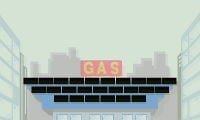Flat Zone 2: Difference between revisions
No edit summary |
(→Trivia: Flat zone 2 is combined with flat zone to make flat zone x which should be noted hear.) |
||
| Line 80: | Line 80: | ||
*This is the only [[unlockable stage]] in ''Brawl'' to not appear in ''[[Ultimate]]''. | *This is the only [[unlockable stage]] in ''Brawl'' to not appear in ''[[Ultimate]]''. | ||
**Additionally, it is the only stage that has ever appeared as a [[Past Stage]] to not appear in ''Ultimate''. | **Additionally, it is the only stage that has ever appeared as a [[Past Stage]] to not appear in ''Ultimate''. | ||
**However Flat Zone X is a combination of this stage and Flat Zone. | |||
==See also== | ==See also== | ||
Revision as of 10:24, November 11, 2018
Not to be confused with Flat Zone or Flat Zone X.
| Flat Zone 2 | |
|---|---|
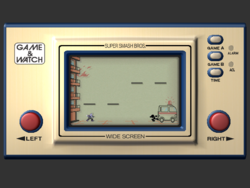 Flat Zone 2 in Super Smash Bros. Brawl 
| |
| Universe | Game & Watch |
| Appears in | Brawl SSB4 (3DS) |
| Availability | Unlockable (Brawl and SSB4) |
| Unlock criteria | Unlock Mr. Game & Watch. (Brawl) Unlock Mr. Game & Watch and complete the first page of Challenges. (SSB4) |
| Crate type | Presents |
| Maximum players | 4 |
| Tracks available | In Brawl: Flat Zone 2 Chill (Dr. Mario) Flat Zone (Melee) Bolded tracks must be unlocked In SSB4: Flat Zone 2 Flat Zone (Alternate) |
Flat Zone 2 (フラットゾーン2, Flat Zone 2) is a stage in Super Smash Bros. Brawl and Super Smash Bros. for Nintendo 3DS. It is the second Game & Watch stage in the Super Smash Bros. series, the first being Flat Zone in Super Smash Bros. Melee.
A stage named Flat Zone X appears in Super Smash Bros. for Wii U and Super Smash Bros. Ultimate, which consists of Flat Zone 2 with the addition of a transformation based on Flat Zone.
Stage layout
Like its predecessor, Flat Zone, it is set on a standard Widescreen Game & Watch titled "Super Smash Bros." Unlike Flat Zone, however, this stage shifts between different Game and Watch scenarios, with every change being signaled by the appearance of a specific element.
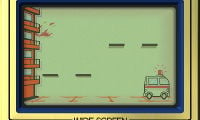
Fire (1981 version): This scenario is the main area of the stage - the match always begins here and the other games have to revert back to Fire before the stage can change again. People jump out of a burning building as firemen with a trampoline attempt to catch them. The levels of the building can be stood on, and the trampoline that the firemen use can be bounced off of like a spring. When the firefighters aren't present, the randomly moving platforms from Manhole appear, similar to those in Melee's Flat Zone. The treasure diver from Octopus sometimes appears, collecting items lying on the ground.
The upcoming shift to Fire is signaled by a fireman who appears in the top right of the screen, ringing a bell.
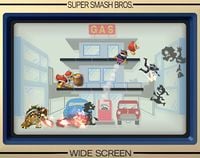
Oil Panic's bottom screen (1982): A multi-tiered gas station building can be stood on. Customers standing below attack if attacked by players; the man will attack immediately when he receives damage, while the woman will delay for almost a second after being damaged before attacking.
The upcoming shift to Oil Panic is signaled by a policeman who appears in the top right of the screen, ringing a bell.
Lion (1981): The center of the stage is a three cage on three levels with a semisoft top. Two Lion Tamers holding chairs flank either side, moving up and down. Being hit by a chair deals high damage and horizontal knockback, often resulting in being knocked into the Lion Tamer at the other side of the cage with the same effect, or even beyond the side blast lines.
The upcoming shift to Lion is signaled by a panther who appears in the top left corner of the screen, ringing a bell.
Chef (1981): Two sets of platforms hover in midair, and a chef throws damaging food around with his pan. If the chef is hit with a strong enough attack, he will fly off screen and the game will return to Fire.
The upcoming shift to Chef is signalled by a kettle which appears in the left side of the screen, with steam in shape of a bell coming out of it.
Ω form
The Ω form features a brick platform above the normal ground. and blast lines are moved further back. The stage is set in the Oil Panic section and does not transition. It is visually identical to the Ω form of Flat Zone X.
Origin
From 1980 to 1991, Nintendo produced handheld electronic games called Game & Watch, and there would be one game for each model of a Game & Watch. Game & Watch games use an LCD screen, the same type on an ordinary calculator, which means characters and other moving objects can only move to pre-determined locations on the screen and everything appears flat. Whenever objects moved, a beep sound could be heard. In this stage, the fighters and stage elements on the screen are all flat, and beeping sounds are heard when walking on the stage.
The default stage layout is based on the widescreen 1981 re-release of Fire, which originally came out in 1980 as part of the Silver Game & Watch series. In Fire, two firemen holding a stretcher try to bounce people jumping out of a burning skyscraper to a nearby ambulance. Fire was also the only Game & Watch device from the "Widescreen" series to have a blue outline.
The other stage transformations are based off of the Game & Watch games Lion, Oil Panic, and Chef: Lion involves two lion tamers trying to keep multiple circus lions in their cage with chairs; Oil Panic involves a gas station employee trying to dump oil into his boss's oil drum below so it could be taken to people who needed their cars filled; and Chef involves a chef trying to keep several pieces of food in the air.
Tournament legality
Like its predecessor, Flat Zone 2 is banned in competitive play, due to the variety of damaging hazards (such as the falling food items in the Chef scenario), the small size of the stage, the camera's refusal to zoom in at any point, the constantly changing stage setup, and the removal of the lower blast line (which makes techniques that require it, such as meteor smashes and edge-hogging, virtually useless). Furthermore, the walk-off edges allow characters to throw or spit others off the side blast lines.
Trivia
- On this stage all characters are two-dimensional (or rather, their three-dimensional models are flattened). Strangely enough, certain effects are still three-dimensional.
- The Super Mario Maker and Hanenbow stages also have this trait.
- Whenever a player gets Star KO'd or Screen KO'd, both the character and the effects fly off separately. This can be best seen from Olimar's beacon, the flame on Charizard's tail, and when the player is frozen. This also happens in Hanenbow.
- A similar effect appears when characters are Screen KO'd on this stage in Super Smash Bros. for Nintendo 3DS, the Screen KO'd character's shadow appears under them as they fall to the bottom of the screen. This allows for the player to see the Screen KO animation in it's entirety, though this can't be replicated in Super Smash Bros. for Wii U's Flat Zone X due to the stage disabling Screen KOs for unknown reasons.
- This stage with Mushroomy Kingdom, Rumble Falls and Mario Bros. are the only "fixed camera" stages in Super Smash Bros. Brawl.
- The firefighters with the stretcher are actually playing the game Fire with the G&W people in the background. However, three misses will not give a game over in this case.
- Lion is generally considered to be the odd one out. It is the only Game & Watch game that is not part of Mr. Game & Watch's special moves, instead it is part of one of his tilt attacks. As well as that, it is the only game that did not use the "Left - Right" button configuration that is on the Flat Zone 2 system.
- In English, the top of the Game and Watch says, "Super Smash Bros." In the Japanese version, it says "Smash Brothers." This is because in Japan, the series is called "Great Fray Smash Brothers" rather than "Super Smash Bros." This is also noticeable on the level select icon, at least in Super Smash Bros. for Nintendo 3DS.
- In All Star mode, when battling Mr. Game and Watch, a player can simply run to the left side on the building part and crouch. The CPU Game and Watch will go to the second floor of the building, going left and right for a while and suddenly self-destruct.
- This stage can be seen prior to its unlocking in a clip of Diddy Kong's Congratulations video in Brawl.
- Lion and Oil Panic were never a part of the Widescreen series of Game & Watch games, despite their appearance on the stage. In fact, Oil Panic was a part of the Dual-Screen series so there is an entire screen missing from the stage.
- Unlike the original Widescreen devices, the device that surrounds Flat Zone 2 doesn't say "Nintendo" beneath the Game & Watch logo on the left.
- In Super Smash Bros. for Nintendo 3DS, the challenge that unlocks Flat Zone 2 is the only challenge that unlocks a stage not to be in the first panel, which requires all the challenges on the first panel to be completed before it can be accessed: this makes Flat Zone 2 always the last stage to be unlocked in the game.
- This is the only unlockable stage in Brawl to not appear in Ultimate.
- Additionally, it is the only stage that has ever appeared as a Past Stage to not appear in Ultimate.
- However Flat Zone X is a combination of this stage and Flat Zone.
See also
External links
|
| |
|---|---|
| Fighter | Mr. Game & Watch (SSBM · SSBB · SSB4 · SSBU) |
| Stages | Flat Zone · Flat Zone 2 · Flat Zone X |
| Trophies, Stickers and Spirits | Trophies (SSBM · SSBB · SSB4) · Stickers · Spirits |
| Music | Flat Zone · Flat Zone 2 |
